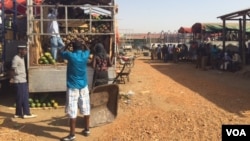At the Gumbo market in South Sudan’s capital, Juba, stall owners squint into the sun as they watch workers offload truckloads of onions, pineapples, sugarcane and mangoes newly arrived from Uganda and Kenya.
Some say business is OK. Others say it could be better, as traders usually do. But they all agree on one thing: The dollar is way too high.
That’s just one of the impediments to profit. The possibility of sanctions also looms, after the United Nations Security Council last week approved setting up a system to target people interfering with peace efforts in South Sudan, a young country gripped by civil war since late 2013. But the dollar poses immediate concerns.
"Business is fair, the dollar is the problem," says Moses, a Ugandan potato trader. "We are going to stop any time because [there are] no profits now."
South Sudan receives most of its U.S. dollars from the sale of oil. But the ongoing conflict has curtailed output, meaning the central bank has fewer dollars available. The low price of oil worldwide also may be adding to the strain.
This, in turn, is pushing up the black market exchange rate for the South Sudanese pound. It now stands at about 6.5 pounds to the dollar, more than twice the official rate offered by the central bank.
High dollar’s impact
Bereket Adera Worky, an Ethiopian businesswoman selling clothing in Juba, also is thinking about closing up shop.
"There [are] no dollars in the banks," she says. "That means when we sell South Sudan pounds, we have South Sudanese pounds but we don’t have dollars. No other country accepts South Sudanese pounds, so we cannot do anything. That’s why [it is] not easy to import."
Making the problem worse are reports that South Sudanese banks are selling off their own dollars on the black market and pocketing the profits.
Corruption takes big toll
If inflation is the first and most obvious pressure on businesses here, the second is corruption.
Stephen Mugesha, another trader at Gumbo market, explains that driving from the Ugandan border to Juba – a distance of about 200 kilometers or 124 miles – means stopping at numerous tax stations and paying bribes to police officers along the way.
"One man can come to you and say, 'You pay 200 pounds.' Then after paying him, another one come and you pay, like, 300. That is a problem here," he says.
Corruption is not just a problem of economy. It also can weaken security structures.
The recently leaked draft of an African Union inquiry report into the South Sudan conflict outlined examples of high-level corruption in the country, including accusations of military officials stealing salaries from soldiers.
In a country at war with itself, this kind of behavior can easily divide ranks.
Just last week in the town of Wau, in Western Bar el-Gazhal state, a conflict broke out between soldiers and police who were on strike over three months of missing wages. Four people were killed.
The government has since paid the police two months’ back pay.
Threat of international sanctions
Now add the third pressure to this scenario: the threat of sanctions.
On March 3, the U.N. Security Council approved the possibility of imposing asset freezes and travel bans on those responsible for the conflict in South Sudan. The idea is to pressure them into reaching peace and to hold them accountable for their actions.
Last year, the United States imposed some limited sanctions on individuals in South Sudan with the same hope of encouraging peace.
While the U.N. sanctions would be targeted, South Sudanese economist James Garang of the Ebony Center for Strategic Studies worries such a move could have a wider impact.
"I think they may have a bite," he says of the sanctions. "Because when you target individuals, you indirectly target the innocent bystanders, the civilian population."
Garang argues there is no way to target just one individual. South Sudan is by nature an extended society, he says, with communities spread across the region in Ethiopia, Kenya and Uganda, for instance. He says cutting off the accounts of one person will affect families all over.
He adds that putting the squeeze on bank accounts in Switzerland or New York, for example, may encourage the country’s elite to plunder accounts at home.
"If they cannot access their account, they will access an account here in Juba," Garang predicts. "If you prevent them from touching their own and the rules are so weak, they are likely to grab from what belongs to the public – and there’s no way to prevent that."
The U.N. consideration of sanctions is only the latest sign of the international community’s growing frustration with the failure of South Sudan’s warring factions to resolve the conflict. All sides agree that is the only sure way to bring much-needed stability to the fractured state.




